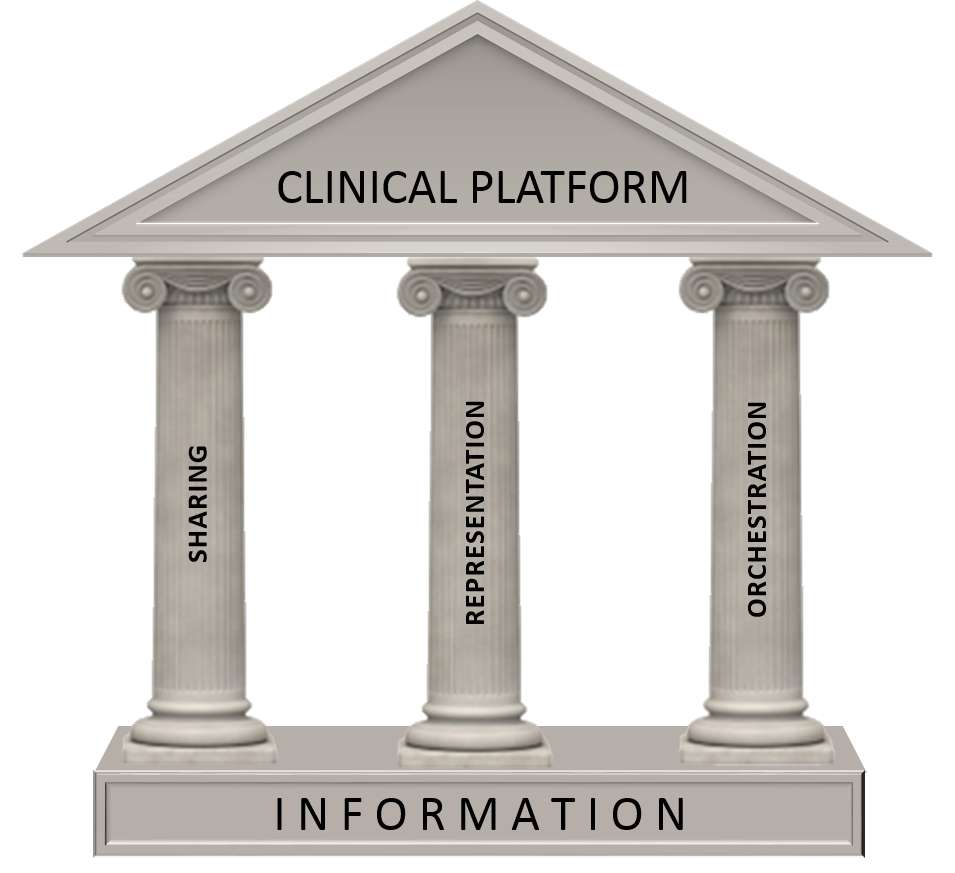A true clinical platform starts with a foundation of two primary supporting pillars. Thefirstis the ability to accurately represent medical information and thesecondis the ability to share both patient specific information and knowledge. In this post we will explore the third pillar, which is the platforms ability to integrate patient information with medical knowledge, reason over it and deliver appropriate insight and advice to the provider. This ability to organize information, knowledge and logic in a meaningful way is essentially the brain of our clinical platform. This brain provides the orchestrated intelligence necessary to help the platform shoulder part of the cognitive burden necessary for precision medicine.

Why does the provider need a platform with a brain?
There are a number of contributing factors that make providing care for patients challenging. Here are three significant ones.
Too much information
No matter how smart, dedicated and knowledgeable a provider is, they are still only human. They have the same 24 hours per day and seven days a week everyone else does. The vast amount of new and existing medical knowledge far exceeds the human mind’s capability for acquisition, storage and retrieval. In a paper posted in theJournal of the Medical Library Associationit is estimated that approximately 7200 articles relevant to primary care are published each month. The time to read these articles would average around 675 hours per month. The total time available in a 30 day period is 720 hours. That would leave 45 hours for non-reading activities. If the provider gets to sleep for an hour a night that leave 30 minutes per day to see patients (assuming other biological imperatives could be resolved while still reading...).
Not enough time
Even without the burden of staying current with medical literature, providers experience significant time famine. According to the2014 Physicians Foundation survey:
- Physicians work an average of 53 hours per week.
- 81% of physicians said they were overextended or at full capacity
- 44% of physicians plan to take one or more steps that would reduce patient access to their services.
- 72% of physicians believe there is a physician shortage.
- A majority of physicians on average see 20 patients per day.
Too many ways of doing something
Whether they are from the institution, the government or and affordable care organization, shifting policies and guidelines can result in rework, frustration and non-payment.
Orchestrated Intelligence
Computers were designed to perform the heavy lifting of information processing. The brain of a true clinical platform would be designed to complement the intellect, training, experience and intuition of a provider by rapidly assessing the patient against a curated medical and policy knowledgebase and provide orchestrated, intelligent information that is relevant and appropriate. I am going to call this ability to assess and reason over available information “orchestrated intelligence”.
Orchestrated Intelligence isnotSkynet…

Please note that orchestrated intelligence does not access the internet or peruse medical journals. It does not google the patient in an attempt to determine their social history. It is not an artificial intelligence bent on the domination of human kind as we know it (you can remove yourtinfoil hat…). It is only allowed to know what we tell it, and it is only allowed to reason using the knowledge we have enabled and approved. Orchestrated intelligence is intended to be an assistant to the provider, not a replacement. Like withthe GPS metaphor, the driver needs to retain control of the vehicle.
今天有策划的情报吗?
The closest thing we have to an orchestrated intelligence today is something we refer to as “clinical decision support” or CDS. The architectural limitations of today’s CDS, coupled with our inability to represent patient information and express knowledge in a granular, post coordinated way, results in a blunt, clunky, hit or miss experience for the provider. No, todays CDS will not be adequate in a true clinical platform.
What are some of the characteristics necessary to support Orchestrated intelligence?
An orchestrated intelligence is central to the architecture of the clinical platform. It is designed to have real-time access to patient information, evaluate approved clinical knowledge and policies and interact with the provider and medical staff. In order to do this in a meaningful way it will need to exhibit a minimum set of characteristics:
There can be only one
In many systems today CDS is divided across domain or functional silos that are invoked based on different events. This results in inconsistent and duplicated messaging to the provider. An orchestrated intelligence should be a central mechanism that evaluates patient information and provides feedback and advice to the provider.
Let the best content win
In many systems today CDS is single source. An orchestrated intelligence should be able to integrate the content and services the steward of the environment wants, regardless of its source. This could be from multiple content vendors, web service providers, open standards and locally created wisdom.
Constant vigilance
In many systems today CDS is invoked only at certain provider events. An orchestrated intelligence should be constantly monitoring “active” patients to see if there is something that should be brought to the attention of the provider. Providers need to sleep, computers do not.
提供e the right information
今天在许多系统光盘提供警报not relevant for the patient. This results in alert fatigue and undermines provider confidence. An orchestrated intelligence needs to be able to embrace a more granular, post-coordinated representation model and deliver advice that is attenuated to the details of the patient.
Know your audience
今天在许多系统光盘提供警报not appropriate for the provider. An orchestrated intelligence should be able to deliver advice in a way that is appropriate to the type of user.
Embrace localization
In many systems today localizing CDS is difficult and can impact the ability of the platform to continue to get updates from external knowledge sources. An orchestrated intelligence must be designed to embrace the idea that healthcare is local. An institution wanting to leverage external knowledge does not want to give up control over how they practice medicine.
Measure performance
An orchestrated intelligence will need to monitor its own performance. This allows the steward of the environment to see how often certain knowledge is engaged and examine the result of that engagement. If you want to improve something, you have to measure it.
Understand the intent of your advice
An orchestrated intelligence must have the ability to understand and articulate the desired outcome related to each piece of advice it renders. Without this ability it has no way to determine if the advice is actually working in a reasonable timeframe.
Predict the future
An orchestrated intelligence needs to think about more than what is happening right now. It must have the ability to provide a framework that supports predicting the future based on trends and patterns in the patient information over time. To do this it must have a sense of temporality.
Ask the right questions
An orchestrated intelligence needs to have the ability to ask for information when it is needed. This information then needs to be integrated into the patient’s clinical context for future reference.
These are some of the core characteristics that, along with the first two pillars, will enable a clinical platform to provide intelligent, appropriate advice at the point of care. It could also result in an environment where the data stewards can measure and assess the efficacy of the advice and policies being used in their environment in real-time.

Comments are welcome and appreciated.




